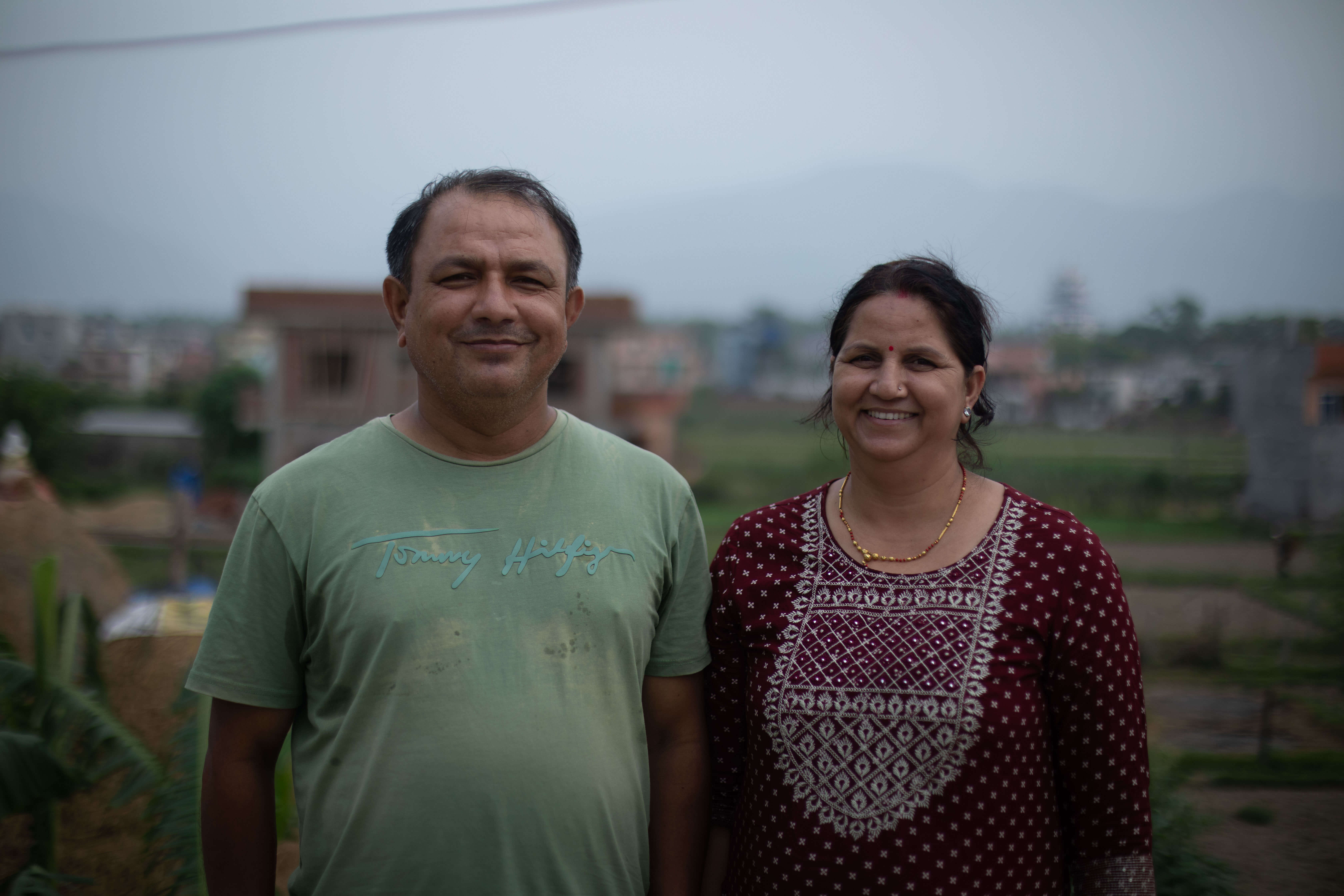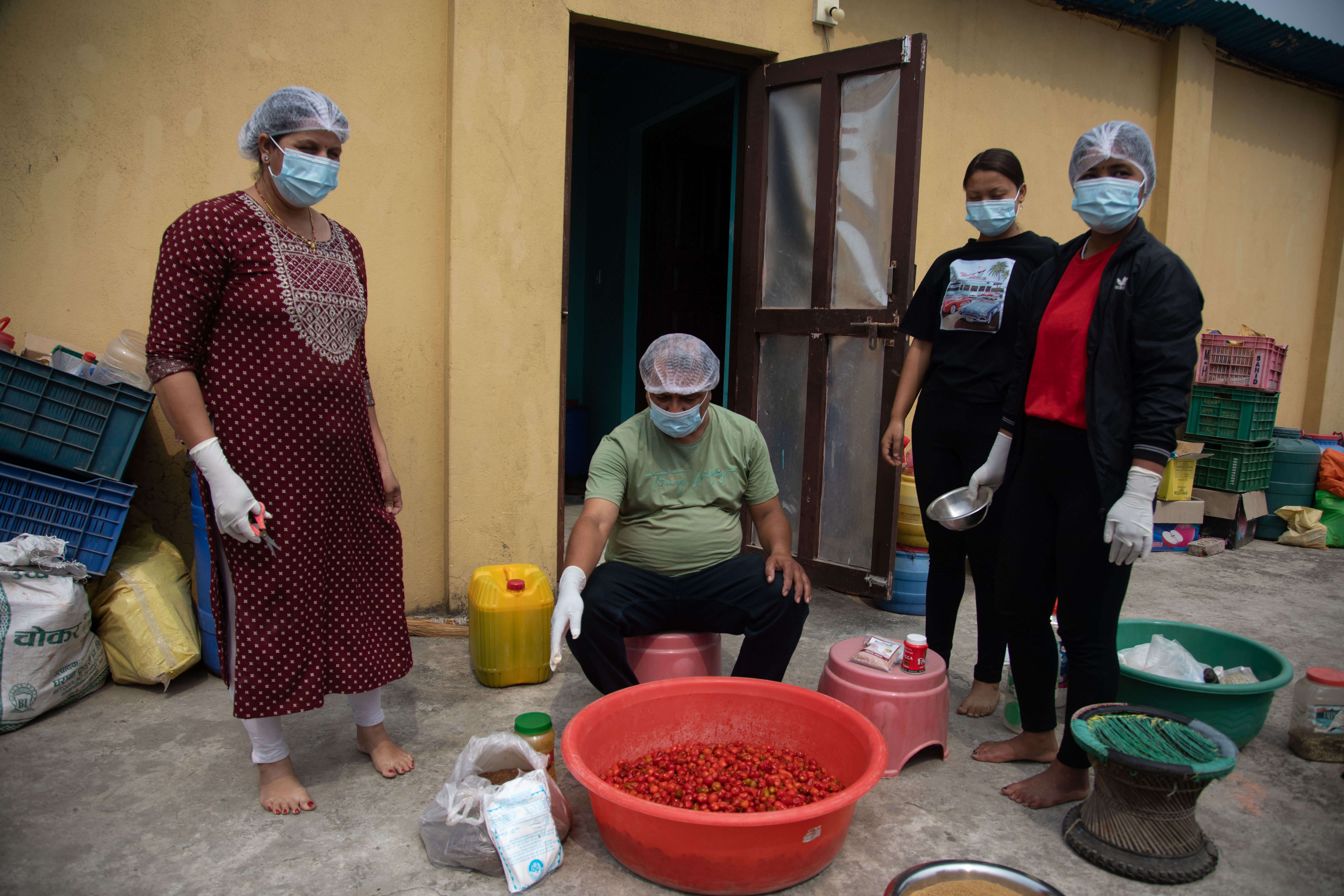Life in a pickle
Married at the age of 14, a Nepali woman finds her footing
The tangy aroma of spices pervades the small house of Parbati and Bhesh Giri in the town of Tilottama, welcoming visitors.
The discerning can detect timmur pepper, Himalayan black salt, myrobalan, asafoetida and a mix of other exotic spices, and the aroma gets stronger up the stairs to the terrace where there are barrels filled to the brim with chilli, lime, raw mangoes and other fruits and vegetables.
For the past five years, this is where Parbati, 40, has been preparing her brand of achar pickles with her husband Bhesh Raj.
What started as a last-ditch attempt at financial independence has now grown into a booming business, earning the couple a profit of Rs75,000 a month.
Parbati’s special recipe for homemade pickles provide steady income for the family, allowed the couple to send their children to school and even convince her husband to return from the UAE.
"What I have learned from my experience is that not everyone is going to be helpful, but with the right support anything is possible provided you put in some hard work," says Parbati.
Parbati was only 14 when she fell in love with Bhesh Raj, who was seven years older than her. She was a Grade 9 student and he was working in India when the two eloped to India. They stayed there for the first six months. When they came back, she was three months pregnant with her daughter Rekha.

Having grown up as the youngest daughter in a large and affluent joint family, Parbati had never had to work in her life. But at the in-laws, she was the oldest daughter-in-law. Societal norms dictated that she was responsible for the entire household.
Her husband’s earnings in India were not enough to support the family and the couple was also constantly pressured to have a son. It got to the point where the in-laws threatened a second marriage for Bhesh Raj.
"We did not want another child because we felt we did not have the means to take care of two children," recalls Parbati. "But for the sake of the family and society we decided to try again, and our son was born.”
For the next few years, things got better. Bhesh Raj left his job in India and went to Dubai. Although he was earning more, Parbati wanted him to return.
It was not easy living in a joint family of in-laws. Bearing the stigma of elopement, she did not have anyone to confide with. When she finally decided to move out and live separately, her husband in the UAE supported her decision.
“I never told him anything about the house, whatever he knew was through his own observations, but he was always very supportive of me and that is all that mattered,” she remembers.
In 2017, Parbati joined a two-day pickle making training organised by a local cooperative after which she joined six of her fellow-trainees to start the Subhalabha Pickles venture with an initial investment of Rs5,000 from each member.
During this time Parbati learnt the basics of procuring produce, market prices, as well as bookkeeping and rate lists.
Read Also: Money grows on trees here, Sahina Shrestha

A year later in 2018, she struck out on her own to establish her own pickle brand LaKaC. The business took off, and she called her husband home from Dubai.
Initially, Bhesh Raj admits he was embarrassed to be involved in the business. When they set up stalls in the local market fairs, he would stand in a corner and watch his wife. Five years on, he is the one out in front, taking the pickles to market and planning business expansion.
“I was a migrant worker for 22 years and all I knew was how to do 12-hour shifts, go back to the dorm and repeat that daily cycle. Once I saw how much customers appreciated our pickles, it motivated me to be more involved,” says Bhesh Raj, who gives full credit to his wife for motivating him and giving him the opportunity to learn.
LaKaC has a range of 21 varieties of sweet and savoury pickles, including that of akbare, lime, mangoes, and mushrooms. The business has grown and the couple has rented a shop along the highway and delivers the products to Palpa, Bhairawa, Butwal and further afield. The monthly turnover now exceeds Rs300,000.
What sets this business apart to other pickle ventures is that the Giris also make sure that the spices and raw materials used are of good quality and maintain hygienic standards. Those visiting the shop in Shankarnagar have the option to taste the pickles before buying.
In 2019, Parbati was nominated in the top five of the Mayor-Daayitwa Rural Enterprise Acceleration Program and won a Rs50,000 award. LaKaC also won an award from a local cooperative.
She credits Daayitwa with training to make business plans and strategy, as well as to communicate with the community.

When the Covid lockdown started in 2020, Parbati worried that her pickles would go to waste. So she called up her customers to see if they were willing to still buy the pickle, and negotiated with the ward chair to allow deliveries following health safety protocols.
Parbati considers the social and political activist Devi Wagle, who encouraged her to start her business and go back to school, as her mentor. Wagle has noticed that Parbati has become more confident over the years.
“There are people who just talk about doing things, and then there are people like Parbati who go on to actually do things. That is what sets her apart from others,” Wagle says. “Everyone can learn from her industriousness, hard work, and persistence.”
Parbati now also trains other women in pickle-making and is involved in social work. “One way that women can be independent is through entrepreneurship and I want to help other women like me to stand on their own feet,” she says.
Having married at an early age, Parbati did not get to finish school. But as her children grew up and her business got bigger, she decided to go back to school at age 37.
She admits she was a little shy in the beginning to be in a classroom with fellow students who were the age of her children. But overcame the shyness to enroll in an open school to finish her SEE.
Getting back to classroom work however, was not easy since she had been out of school for two decades. The coursework had changed and she especially struggled with Maths and English. Not one to give up, she set aside time from 8pm to 12am every day to self-study after long days at work.

“In open schools you often see students who come for the sake of getting a certificate but with Parbati, she really wanted to learn and that stood out the most about her. She never hesitated to ask questions or learn from her peers,” says Narayan Subedi, who taught her mathematics in Grade 10. “It was her dedication that earned her a higher than expected grade in SEE.”
Recently Parbati appeared for her Grade 12 exam with a major in sociology and journalism, and wants to go on to get an undergraduate education as well.
While Parbati is busy at school, Bhesh Raj looks after the household. Their son 16-year-old Rohan describes the partnership as inspiring: “My mother is inspirational and works hard but it wouldn’t have been possible without the support of my father.” His goal is to beat his mother’s grade in SEE.
Bhesh Raj is happy with where they are today. "I toiled in foreign countries for half of my life, but now I understand that if we work hard, we can grow gold in Nepal itself," he says.
The couple is now looking to expand their market to Kathmandu and rent out a space for a warehouse in their hometown so that they can stock raw materials for pickles.
For all that Parbati has achieved, she remains true to her roots and wants to continue helping and encouraging other women in her community. Says Parbati, “I want them to look at me and think that if she can do it, I can too. Whether it is starting a business or going to school at an older age, I hope my journey inspires them."
This is the second in the series Striking Roots, where we feature the stories of entrepreneurs from across the country. If you know someone whose story needs to be shared, email us as [email protected]
writer
Sahina Shrestha is a journalist interested in digital storytelling, product management, and audience development and engagement. She covers culture, heritage, and social justice. She has a Masters in Journalism from New York University.




